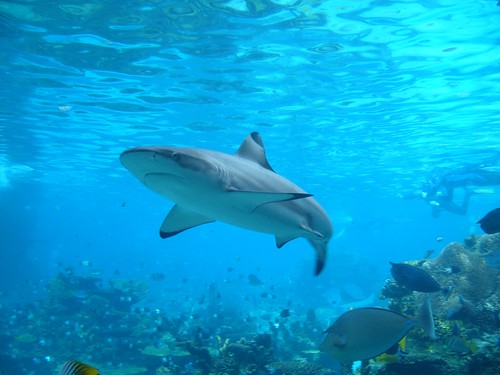 Pro-shark fishing nations have narrowly failed to overturn a landmark protection deal struck at the Cites conservation conference in Bangkok.
Pro-shark fishing nations have narrowly failed to overturn a landmark protection deal struck at the Cites conservation conference in Bangkok. Japan and China tried to block trade regulations on three critically endangered shark species by re-opening the debate in the final session. But delegates refused the request by a wafer-thin majority and the shark ban was upheld.
The decision is being seen as a landmark win for animal conservation. Campaigners say it is a truly historic day for the species, in which science triumphed over politics.
On Monday, the decision to increase protection for oceanic whitetips, porbeagle and hammerhead sharks had only scraped past the two-thirds majorities required by a handful of votes.
Campaigners had been extremely worried that China and Japan, the main opponents of the measures, would be able to muster the one-third support needed to re-open the debate and block the ban. In a tense session here in the conference centre, they failed by just over 1%.
'Major step'
UK environment minister David Heath, who had just arrived in Bangkok, told BBC News that this was a great day for the Convention. "I’m absolutely delighted. I think this is a major step forward today. What we saw was member states across the board say 'we are not going to be diverted from our path'," he said. The proposals will not ban the fishing of these sharks but it will mean that for the first time, the international trade in them will be regulated.
Similar attempts at previous meetings of Cites had ended in failure. What seems to have made the difference here in Bangkok was the unity of Latin American nations, who all stood behind the proposals.
Hesiquio Benitez from the Mexican delegation told BBC News that this decision was good for sharks and for those communities that make their living from the sea. "It's important to know that this is not prohibiting trade for domestic markets, it is not against the fisheries communities. It is to have more control, to have better assessments in the populations," he said.
Campaigners who had worked for decades to get these species listed in Appendix II of Cites said it was a landmark day.
The Appendix lists species which may become threatened with extinction unless trade is closely controlled.
"This is an historic day for marine conservation," said Glenn Sant from Traffic International. "Shark populations are in freefall, but have been thrown a lifeline today - Cites has finally listened to the scientists," he said.
Source: BBC
Image courtesy of StormyDog via Flickr (CC BY 2.0)
